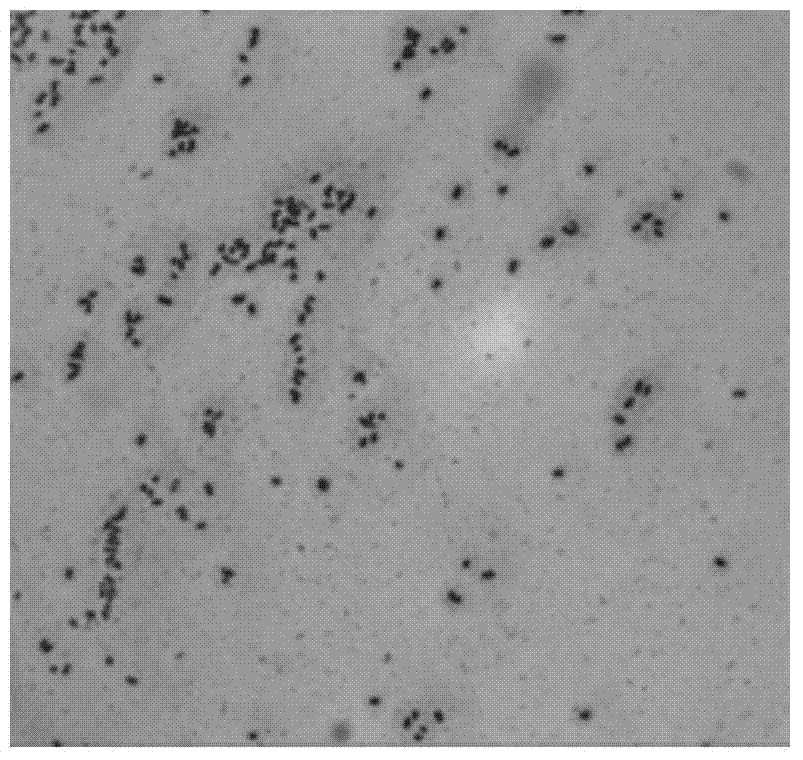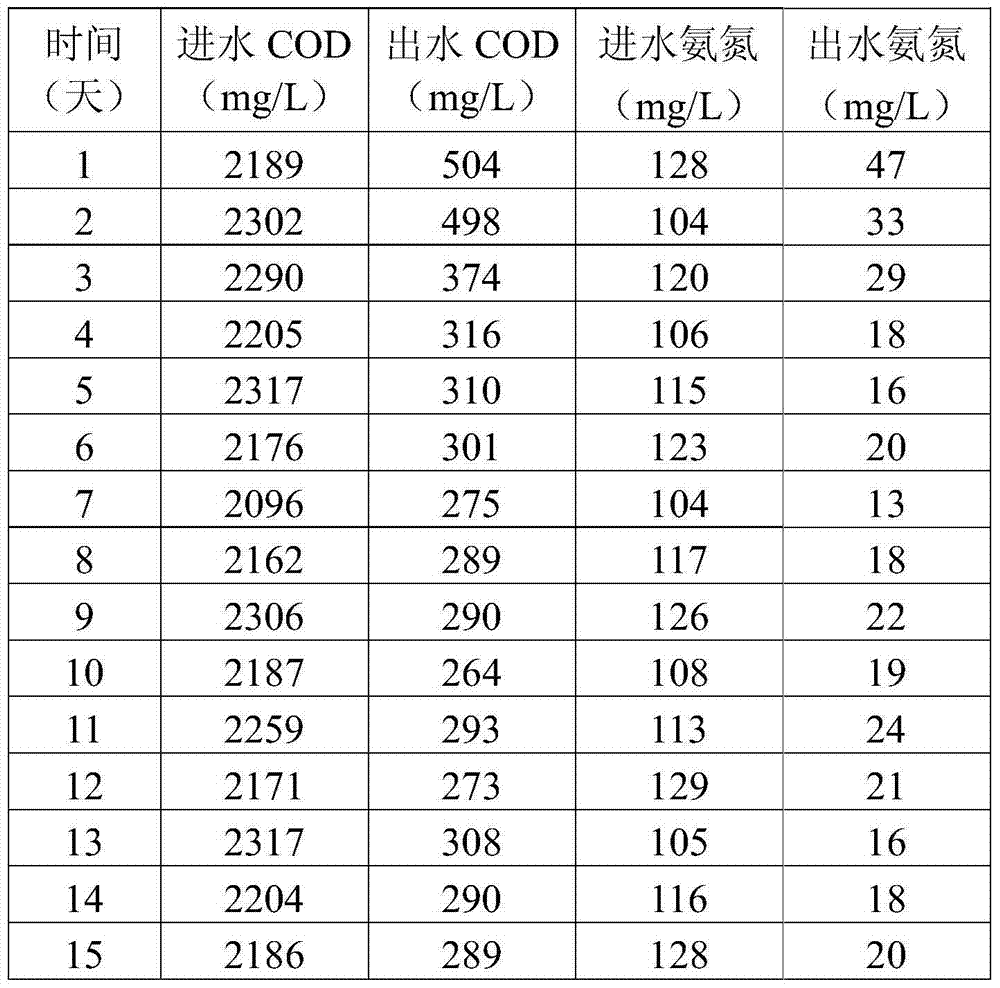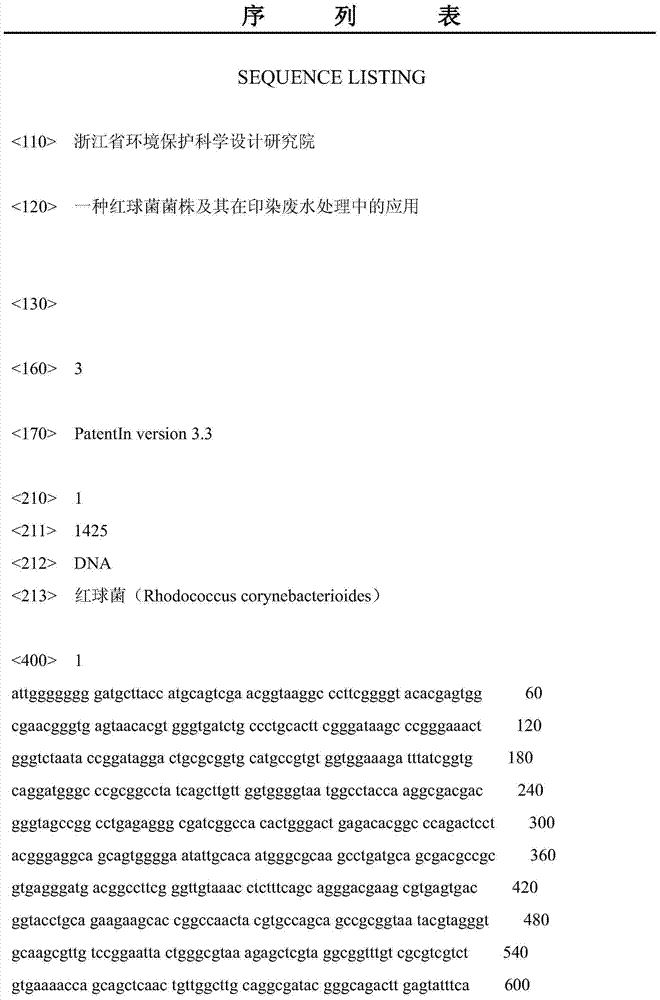Rhodococcus corynebacterioides strain and application thereof in printing and dyeing wastewater treatment
A technology of printing and dyeing wastewater and rhodococcus, which is applied in textile industry wastewater treatment, biological water/sewage treatment, water/sludge/sewage treatment, etc., can solve problems such as failure to achieve results and capacity decline, and reduce production costs and Use cost, low production cost, easy to use effect
- Summary
- Abstract
- Description
- Claims
- Application Information
AI Technical Summary
Problems solved by technology
Method used
Image
Examples
Embodiment 1
[0041] The acquisition and identification of embodiment 1 Rhodococcus ZHY1-4
[0042] 1. Obtaining Rhodococcus ZHY1-4
[0043] (1) Take the activated sludge from the treatment of high-salt dye wastewater, and the composition of the medium is as follows: yeast extract powder 0.01%, MgSO 4 0.05%, KH 2 PO 4 0.05%, Na 2 HPO 4 0.1%, (NH 4 ) 2 SO 4 0.1%, FeCl 3 0.001%, NaCl3%, the final concentration of azo dye is 0.01% (g / V), pH7.0-7.5, sterilized at 121°C for 20min. After cooling the medium, inoculate 10mL of activated sludge, culture on a shaker at 35°C and 130 rpm, and observe the decolorization of the dye. Select the culture solution that has a decolorizing effect on the dye and inoculate it in the same medium for multiple enrichment cultures.
[0044] (2) Take the bacterial solution that has a decolorizing effect on azo dyes for gradient dilution, and use the plate coating method to spread the bacterial solution on a 3% NaCl and 4% NaCl plate, and incubate it in a co...
Embodiment 2
[0056] Preparation and treatment of printing and dyeing wastewater of embodiment 2 microbial bacterial agents
[0057] (1) Inclined seeds: activate and cultivate the strain ZHY1-4 in a petri dish or test tube for later use.
[0058] (2) Shake flask seeds: inoculate the activated single colony in the culture medium (peptone 10g / L, yeast extract powder 5g / L, NaCl 10g / L, glucose 1g / L, pH7.0-7.2), 35℃ Shake culture to late logarithmic growth, ready to inoculate into seed pots.
[0059] (3) Seed tank: prepare seed tank medium (medium composition: peptone 5g / L, yeast extract powder 5g / L, NaCl10g / L, glucose 2g / L, pH7.0-7.5), and cultivate 30L seeds The base was added to a 50L seed tank, sterilized by high-pressure damp heat at 121°C, cooled to 33°C, inoculated into the seed tank at an inoculation amount of 10% (V / V), cultivated at 35°C until the logarithmic growth phase, and stirred The speed is 180 rpm, and the sterile air intake is 1:0.8 (V / V).
[0060] (4) Fermentation tank: Th...
Embodiment 3
[0070] Example 3 Rhodococcus ZHY1-4 treatment of high-salt dye wastewater
[0071] (1) Pick a single colony of Rhodococcus ZHY1-4 and inoculate it in the culture medium (peptone 10g / L, yeast extract powder 5g / L, NaCl 10g / L, glucose 1g / L, pH7.0-7.2), 35°C, Shake culture at 180 rpm for 48-72 hours to obtain fresh bacterial liquid.
[0072] (2) The printing and dyeing wastewater is taken from the regulating pool wastewater of a printing and dyeing factory, with a salt content of about 2%.
[0073] (3) The treatment process adopts anaerobic-contact oxidation-water outlet. The reactor is a 2L cylinder. The carrier in the reactor is a polyurethane carrier. The sludge in the anaerobic reactor is taken from the anaerobic sludge of the dye factory. Dosing at a volume ratio of 10% (V / V).
[0074] Contact the activated sludge in the oxidation tank: add 1% (V / V) of activated sludge from urban sewage treatment plants and 10% (V / V) of Rhodococcus, and add 10% (V / V) of Rhodococcus per day ...
PUM
 Login to View More
Login to View More Abstract
Description
Claims
Application Information
 Login to View More
Login to View More - R&D
- Intellectual Property
- Life Sciences
- Materials
- Tech Scout
- Unparalleled Data Quality
- Higher Quality Content
- 60% Fewer Hallucinations
Browse by: Latest US Patents, China's latest patents, Technical Efficacy Thesaurus, Application Domain, Technology Topic, Popular Technical Reports.
© 2025 PatSnap. All rights reserved.Legal|Privacy policy|Modern Slavery Act Transparency Statement|Sitemap|About US| Contact US: help@patsnap.com



